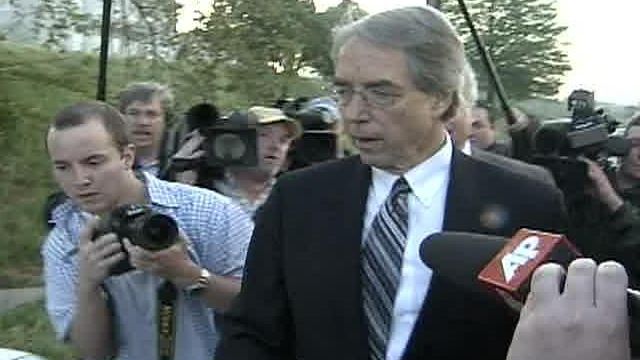J. Kirk Osborn, Attorney in Duke Lacrosse Case, Dies
J. Kirk Osborn, the attorney representing one of the three Duke University lacrosse players accused of rape last year, died Sunday following a heart attack.
Posted — UpdatedFamily members said Osborn, 64, passed away early Sunday morning. He had been admitted Friday to UNC Hospitals.
Osborn represented Reade Seligmann, one of the three players indicted on charges of rape, sexual assault and kidnapping following an incident at a team off-campus party in March 2006. The rape charges against Seligmann and Collin Finnerty and against David Evans, who graduated from Duke last spring, were dropped in December after Durham District Attorney Mike Nifong said the woman who accused the players had wavered in certain details of her account.
Nifong has been accused before the North Carolina State Bar of misbehavior in the case and turned it over to the state attorney general's office, which is now handling prosecution.
There was no immediate indication of how Osborn's death would affect the case, and neither the attorney general's office nor other defense attorneys were immediately available. No trial dates have been set.
Colin Finnerty's attorney, Wade Smith, issued a statement on Osborne's death, saying: "We are hoping the case is over soon and the loss of Kirk will not affect the case."
Lawyers who knew Osborn called him “the real deal” and characterized him as a warrior in the courtroom.
"Not only was Kirk Osborn a very good friend, he was also a zealous attorney and a stellar representative for his clients and showed great professionalism in the courtroom," said Orange County District Attorney Jim Woodall.
Osborn was aggressive in attacking the prosecution's case against Seligmann. The month after the incident, he filed a motion that said, "This request is based on the fact that the complaining witness has a history of criminal activity and behavior, which includes alcohol abuse, drug abuse, and dishonesty, all conduct which indicate mental, emotional and/or physical problems, which affect her credibility as a witness."
Osborn also said last year that information recorded by an ATM machine and other evidence proved Seligmann could not have been involved.
Osborn had represented defendants in several other widely publicized Triangle criminal cases.
Osborn received his law degree from the University of North Carolina Law School in 1974 and was admitted to the North Carolina Bar the same year. He had received bachelor's and master's degrees from the University of Colorado in 1965 and 1967, respectively. He played football at Colorado. He was born in Havre, Mont., according to biography on the Web site lawyers.com.
He represented Kathryn Dawn Wilson, one of the defendants in the Little Rascals day-care center case in Edenton, when she appealed her conviction. Osborn arranged a plea deal that Wilson refused, and the state later dismissed charges against her.
Osborn also helped represent Wendell Williamson, who was found not guilty by reason of insanity in the shootings of two people in downtown Chapel Hill in 1995.
In 1986, Osborn represented George Burke, who was charged with murder for a shooting outside a Chapel Hill bar. Osborn used Burke's history of mental disorders for what Osborn's Web site said "was reputedly the first successful not guilty by reason of insanity defense in North Carolina in more than 80 years."
Another highly publicized case in which Osborn was involved was the 2000 killing of Air Force Capt. Marty Theer in Fayetteville. Osborn represented Michelle Theer, who was accused of conspiring with a lover to murder her husband. She is serving a life sentence for second-degree murder.
Osborn was a board member of the Fair Trial Initiative, a Durham-based non-profit that challenges death sentences for dependents.
Copyright 2024 by Capitol Broadcasting Company. All rights reserved. This material may not be published, broadcast, rewritten or redistributed.





